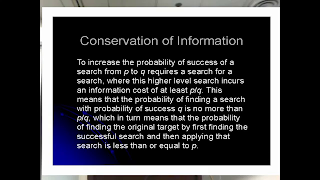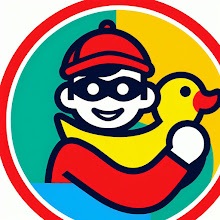Part 4: 45' 00" - 52' 50"
Topics: What is Conservation of Information? Example continued.
William Dembski: These tickets have probability 1/2, 1/2, 1/2, 1/2, and this one ticket has probability 1. If I happen to get this ticket, I have probability 1/2 of choosing curtain 1, but it is also probability 1/9 of getting that ticket. When you run the numbers, at the end of the day, by using these tickets, I'm not better of than I was originally. It is still only a probability of 1/3 of finding curtain 1, of finding the prize there. Once one factors in how did I limit myself to these tickets in the first place. Going from this whole space to this, that is information intensive. I have ruled out certain possibilities, that incurs an information cost. As I said, the cost is 5/9. It is really just an accounting thing. That is what conservation of information is. Once you factor in the information that it takes to get the search, get a search which has improved the probability for finding your original target, we haven't gained anything. It is called Conservation of Information, as the problem can even get worse. At this case, we have broken even, we are back to 1/3 for the probability of getting the prize, but let's say, you really want to improve the probability, you want to guarantee that you get that prize with this tickets. Well, then you have got only one ticket that will work for you.

William Dembski: This one. If you get this ticket, you are guaranteed to say "Curtain 1", and you get the prize behind it, but this is one of nine possible tickets. Once you have factored that is, your probability of doing a search for this ticket, and then, with this ticket, find the prize, ends up being 1/9, so you are actually going down. The reason that it is called conservation of information is that conservation is the best you can do, that you can break even. Often times, with these search-for-a-search spaces, they grow exponentially, and your probability of finding the target by going to the search-for-a-search ends up being worse than doing a blind search on the original space. Let me give you one last example, and then we can open this up for some questions. That example:

William Dembski: Find some buried treasure. You have this huge island which is very, very big, so that exhaustive search is impossible. The query limit is very small, there are only a few places that you can check. How do you find the treasure which is hidden inside? You go to a map room.

William Dembski: This map room is actually a bar in Cleveland, but let's imagine that it is a room with maps. What you are going to do is to find a map that has got an X marking where that treasure is. You have displaced the problem of finding the treasure to finding the map in the map room which will take you to the treasure. But how do you know that the map is the right map.

William Dembski: What if there are lot of maps. And you are Randy McNelly. For every place with an X mark, there will be another map with another X marked. The problem of finding the treasure on the island now becomes displaced to finding the search-for-the-search, finding the right map. And the problem is, when you try to represent this mathematically, the search-for-the-search is much less tractable than the original search problem, because, I skipped over a few slides, but these are actually theorems which we have proven on conservation of information. You represent the search-for-a-search, and you find that the information problem has actually intensified.

William Dembski: With the search-for-a-search, searches are as real as the things being searched. I think that is what the Darwinists like Richard Dawkins fail to recognize. By handing us a Darwinian search, when it works, it works because it has been carefully crafted, fine-tuned to work. That is what he bets on.

William Dembski: Let me just finally speak to the question that came up about targets. I had a correspondence with Dawkins. This goes back fourteen years, we have been playing with these ideas for a long time. I was challenging him on his METHINKS IT IS LIKE A WEASEL example, and he wrote: "In real life of course, the criterion for optimisation is not an arbitrarily chosen distant target but SURVIVAL. It's as simple as that. This is non-arbitrary." What is survival? In which context does survival happen? Let us say biology does have targets.

William Dembski: Actually, it is not that simple. The targets that biology presents us with are teleological systems/agents. If you will, the teleology of evolutionary search is to produce teleology. (James Shapiro might refer to these as systems that do their own "natural genetic engineering.") I'd say that even Dawkins' makes a tacit admission of targets in biological evolution.

William Dembski: This is also from his "Blind Watchmaker": "Complicated things have some quality, specifiable in advance, that is highly unlikely to have been acquired by random chance alone. In the case of living things, the quality that is specified in advance is ... the ability to propagate genes in reproduction." That is the [???], but it is still specified in advance, that is the teleology he even admits to. Let me give you one other statement of the conservation of information:

William Dembski: To increase the probability of success of a search from p to q requires a search for a search, where the higher level search incurs an information cost of at least p/q. This means that the probability of finding a search with probability of success q in no more than p/q, which in turn means that the probability of finding the original target by first finding the successful search and the applying that search is less than or equal to p.
The search-for-a-search requires that there is an information cost [???] This implies a regress. I can do a search for the search for the search and so on. At every point you have not [???] the probabilities. When you work everything out, when you do all the commutative operations [?], I have this search-for-a-search, I get this search, and with this search I get a certain probability to find the target. When you do that, and you can regress back as far as you want, the probabilities never get any better. If anything, the information cost does either stay constant or it becomes worse. Which then raise a question: if evolutionary processes, evolutionary search, is not able to create new information but only redistributes already existing information - that is what the conservation of information shows - what then is the ultimate source of that information. I just leave it with that. So, thank you, and we have got a few minutes for questions.
$\frac{1}{9}$=$P("Choosing\,Curtain\,1"|"using\,the\,first\,ticket")\cdot P("using\,the\,first\,ticket") \le$ $P("Choosing\,Curtain\,1"|"using\,the\,first\,ticket")\cdot P("using\,the\,first\,ticket")$ + $ P("Choosing\,Curtain\,1"|"using\,the\,first\,ticket")\cdot P("using\,another\,ticket")$ = $P("Choosing\,Curtain\,1")$=$\frac{1}{3}$
Again, just a thought: imagine nine guys, each one having one of the tickets. Will those who win the prize without holding ticket 1 be less the winner? Repeat the game a couple of times, and each time, someone wins with his ticket, another contestant with the same ticket enters the game. After ten generations, you have more than 1000 holding ticket 1, more than 150 having another ticket mentioning curtain 1, and only 4 guys still having a ticket which always loses....

No comments:
Post a Comment